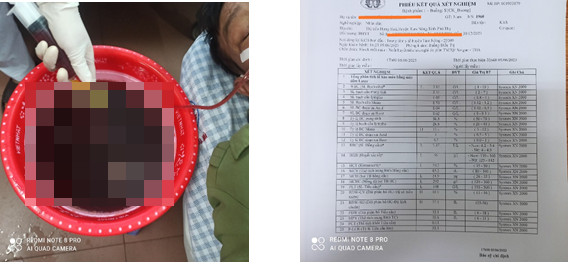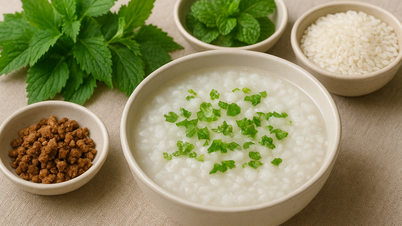Among the hospitalized patients was Nguyen CH (63 years old, residing in Tam Nong District, Phu Tho ). Before this hospitalization, the patient had a history of 8 gastrointestinal bleedings due to esophageal varices and ruptures, and cirrhosis for 4 years.

Blood loss due to esophageal varices can be dangerous to health.
The patient’s family said that at home, the patient regularly drank alcohol, about 500 ml per day. Before being admitted to the hospital, the patient vomited about 1 liter of fresh blood and blood clots, and had black stools.
The patient was transferred by his family to Phu Tho Provincial General Hospital with pale skin and mucous membranes.
At the hospital, doctors quickly conducted a clinical examination, performed diagnostic tests, concluded that the patient had gastrointestinal bleeding due to esophageal varices and ordered an emergency endoscopy.
The patient was treated by doctors of the Department of Internal Medicine, Respiratory and Gastroenterology (Phu Tho General Hospital) with large intravenous lines, oxygen therapy, intravenous fluids, and blood transfusion. The patient had a gastric lavage to remove about 1.5 liters of diluted blood and emergency endoscopy to stop the bleeding.
Endoscopy results showed that the patient had esophageal varices, which were successfully treated by rubber band ligation, hemostasis, portal vein pressure reduction, and liver tonics and vitamins. After treatment, the patient's bleeding stopped and he was clinically stable, and he was treated medically.
According to Dr. Le Thi Hong Nhung, Deputy Head of the Department of Internal Medicine, Respiratory and Gastroenterology, doctors regularly receive patients with gastrointestinal bleeding. In recent weeks alone (from the end of May until now), doctors have received 12 patients with gastrointestinal bleeding due to gastric and duodenal ulcers, esophageal varices, esophageal tears, etc. All cases are related to long-term alcohol use, including patients hospitalized in a state of severe, critical bleeding.
Dr. Nhung said that warning signs of gastrointestinal bleeding can be recognized as: severe epigastric pain, vomiting blood, black or red stools, dizziness, lightheadedness. Severe gastrointestinal bleeding causes shock, drowsiness, cold extremities, sweating, rapid pulse, low blood pressure, organ failure, and even death.
To have a healthy digestive system, you need a reasonable diet, eat on time, have 3 main meals a day, increase foods rich in fiber, fresh vegetables and fruits; do not stay up late; need to balance work and rest time, at the same time exercise and improve resistance.
Source link




![[Photo] Prime Minister Pham Minh Chinh chairs meeting to deploy overcoming consequences of storm No. 10](https://vphoto.vietnam.vn/thumb/1200x675/vietnam/resource/IMAGE/2025/10/3/544f420dcc844463898fcbef46247d16)


![[Photo] Students of Binh Minh Primary School enjoy the full moon festival, receiving the joys of childhood](https://vphoto.vietnam.vn/thumb/1200x675/vietnam/resource/IMAGE/2025/10/3/8cf8abef22fe4471be400a818912cb85)

































































































Comment (0)